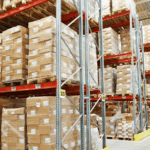Container Freight Stations (CFS) have evolved into critical hubs for modern logistics, streamlining cargo handling and improving efficiency in global trade. Positioned near major seaports and airports, these facilities facilitate the seamless movement of goods between different transportation modes while optimizing storage, inspection, and customs clearance processes. As global supply chains become more complex, the role of CFS facilities continues to expand, providing shippers with cost-effective and time-sensitive solutions.
What is a Container Freight Station (CFS)?
A CFS is a facility that consolidates and deconsolidates containerized shipments, ensuring cargo is efficiently sorted, stored, and transferred for further transportation. These stations are essential for Less than Container Load (LCL) shipments in ocean freight and Unit Load Device (ULD) cargo in air freight. By centralizing logistics functions, CFS operations enhance supply chain efficiency while providing security and regulatory compliance.
The Role of CFS in Modern Logistics
CFS facilities play a pivotal role in freight operations by offering multiple services that contribute to supply chain optimization:
- Cargo Consolidation & Deconsolidation: CFS facilities combine smaller shipments into full containers for export or break down incoming shipments for distribution. This process reduces costs and improves transit efficiency.
- Customs Clearance & Inspection: Customs agencies use CFS locations to inspect shipments and verify documentation before cargo enters or exits a country.
- Temporary Storage & Security: Warehousing at CFS locations offers a secure environment for goods awaiting further transport. This is especially valuable for cargo requiring special handling, such as temperature-sensitive shipments.
- Ancillary Logistics Services: Many CFS facilities provide additional services for businesses, such as labeling, repackaging, freight documentation management, and streamlining international shipping.
Examples of Drayage in Action
Port-to-Warehouse Drayage – A container arrives at the Port of Los Angeles from China. A trucking company picks up the container and transports it to a nearby warehouse for unloading and distribution to retailers.
Rail-to-Final Destination Drayage – A container is offloaded from a train at a rail yard in Chicago. A drayage truck moves it to a manufacturing plant a few miles away, where the goods are used in production.
How CFS Improves Supply Chain Efficiency
The presence of strategically located CFS facilities enhances logistics operations in several ways:
- Cost Savings – By consolidating shipments, businesses save on freight costs and reduce container underutilization.
- Faster Customs Processing – Dedicated clearance areas within CFS facilities accelerate regulatory approvals and minimize port congestion.
- Increased Flexibility – Companies benefit from flexible shipping schedules and reduced dependency on full-container load requirements.
- Security & Compliance – Controlled environments at CFS facilities ensure cargo integrity, mitigating theft and regulatory non-compliance risks.
The Future of CFS in Global Trade
As global trade continues to evolve, CFS facilities are adapting with advancements in automation, digital tracking, and artificial intelligence (AI) to improve efficiency. Smart warehouses, blockchain-powered documentation, and predictive analytics are expected to further enhance cargo management at these stations. Additionally, the expansion of e-commerce and cross-border trade will drive increased reliance on CFS locations to facilitate quicker, more reliable logistics solutions.
“Container Freight Stations are the unsung heroes of modern logistics—optimizing space, streamlining cargo flow, and ensuring supply chains run efficiently. As global trade evolves, CFS facilities will continue to play a critical role in reducing transit times, cutting costs, and adapting to shifting market demands.”
– Steve Panzarella, President, Global CFS
Container Freight Stations remain vital to the global logistics network, offering streamlined operations that reduce costs, improve transit times, and enhance supply chain resilience. As global shipping landscapes shift, CFS facilities will continue to play an integral role in keeping international trade efficient and competitive. Businesses looking to optimize their import and export processes should consider leveraging CFS services to maintain operational agility in an increasingly complex market.
Want to optimize your shipping operations? Global CFS offers cutting-edge solutions that improve cargo handling, customs clearance, and supply chain efficiency. Contact us today to see how our CFS services can enhance your logistics strategy.


